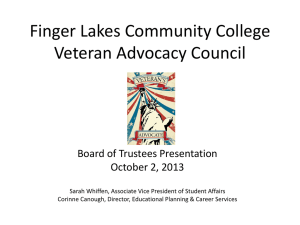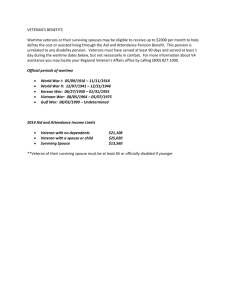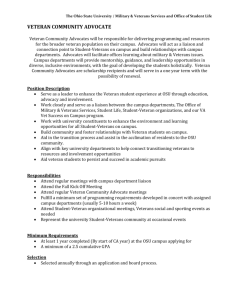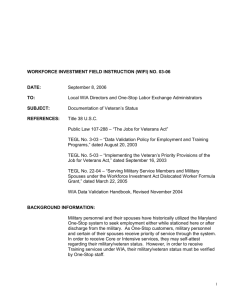Read Materials
advertisement
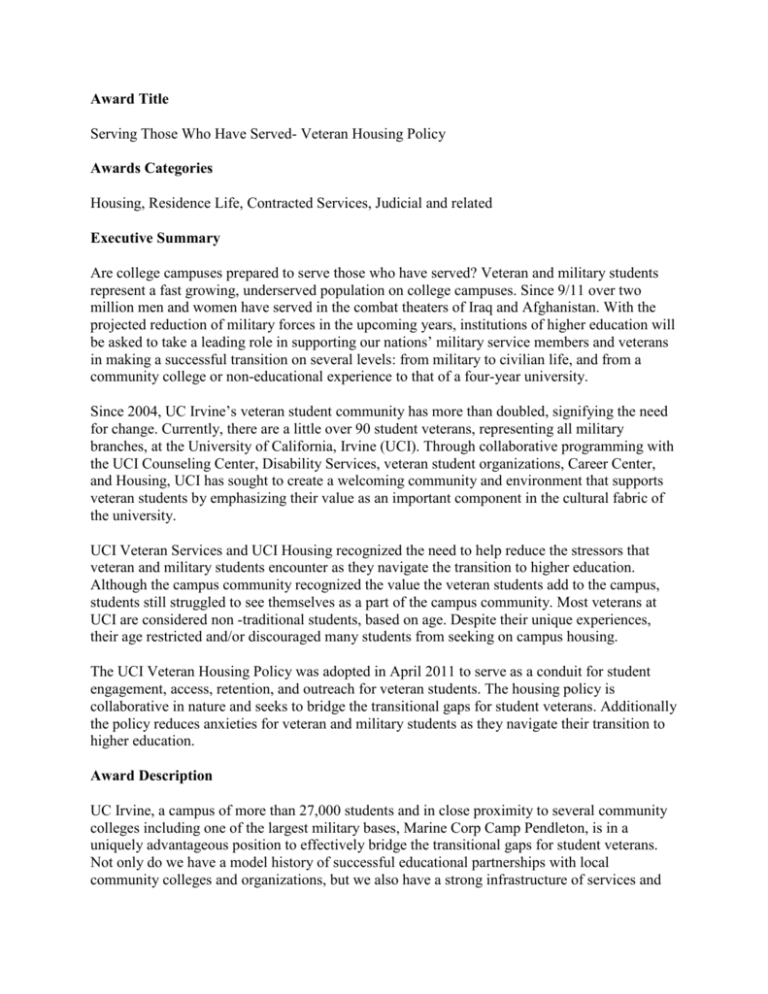
Award Title Serving Those Who Have Served- Veteran Housing Policy Awards Categories Housing, Residence Life, Contracted Services, Judicial and related Executive Summary Are college campuses prepared to serve those who have served? Veteran and military students represent a fast growing, underserved population on college campuses. Since 9/11 over two million men and women have served in the combat theaters of Iraq and Afghanistan. With the projected reduction of military forces in the upcoming years, institutions of higher education will be asked to take a leading role in supporting our nations’ military service members and veterans in making a successful transition on several levels: from military to civilian life, and from a community college or non-educational experience to that of a four-year university. Since 2004, UC Irvine’s veteran student community has more than doubled, signifying the need for change. Currently, there are a little over 90 student veterans, representing all military branches, at the University of California, Irvine (UCI). Through collaborative programming with the UCI Counseling Center, Disability Services, veteran student organizations, Career Center, and Housing, UCI has sought to create a welcoming community and environment that supports veteran students by emphasizing their value as an important component in the cultural fabric of the university. UCI Veteran Services and UCI Housing recognized the need to help reduce the stressors that veteran and military students encounter as they navigate the transition to higher education. Although the campus community recognized the value the veteran students add to the campus, students still struggled to see themselves as a part of the campus community. Most veterans at UCI are considered non -traditional students, based on age. Despite their unique experiences, their age restricted and/or discouraged many students from seeking on campus housing. The UCI Veteran Housing Policy was adopted in April 2011 to serve as a conduit for student engagement, access, retention, and outreach for veteran students. The housing policy is collaborative in nature and seeks to bridge the transitional gaps for student veterans. Additionally the policy reduces anxieties for veteran and military students as they navigate their transition to higher education. Award Description UC Irvine, a campus of more than 27,000 students and in close proximity to several community colleges including one of the largest military bases, Marine Corp Camp Pendleton, is in a uniquely advantageous position to effectively bridge the transitional gaps for student veterans. Not only do we have a model history of successful educational partnerships with local community colleges and organizations, but we also have a strong infrastructure of services and support- including psychological, health, career, academic support—that can be enhanced and honed to meet the needs of transitional veterans. The veterans housing policy signified a major shift in the manner in which student affairs approached the need to serve students. With very limited resources, a team approach to identifying and achieving student retention, leadership involvement, and creating a welcoming community helped pave the way for student success. The significant aspects of the veterans housing policy are based on minimizing stressors for veteran students and supporting them in efficiently navigating the campus community. With so many of these students beginning their postsecondary education at the community college level, it is imperative to have an effective outreach strategy in place as well as comprehensive programming and support systems set to effectively matriculate and retain veterans through the baccalaureate degree program to employment or a graduate/professional degree. Veterans, specifically OIF/OEF combat zone veterans, face significant challenges in transitioning to civilian life and higher education due to several circumstances. In taking a positive approach, in May 2010, the campus conducted surveys and focus groups as part of the needs assessment of the campus veterans’ population. Although on some topics, the student sentiment was split, data exemplified frustration or confusion on behalf of the students. In particular, much of the frustration was contributed to not knowing how to take advantage of all the campus resources, or simply feeling unprepared. However motivated and disciplined, confounding factors seem to prevent student veterans from moving forward. Another important finding to highlight is that although many student veterans were achieving high GPA’s they were rarely involved in experiential learning opportunities outside of the classroom, which is vital in providing a true college experience. According to student development theory, the total environment of the student is educational and must be used to help the student achieve full development. Because most veteran students at UCI are also first generation college students, they are often at a disadvantage in terms of lacking adequate guidance in the college enrollment and transition process. Through focus groups with veteran students and staff, Veteran Services and Housing developed a comprehensive housing policy that addresses deployment and re-entry to the university as well. Understanding that a holistic approach was necessary to serving student veterans, creating access to a housing community was imperative. The campus policy is available for students to access through the Housing web site as well as Veteran Services. The written policy also provides a sense of order and detail that veteran students can relate to and appreciate. http://www.dos.uci.edu/veteran/housing-registration_benefits.php Objectives: • To support veteran and military students in their transition to higher education. • To provide an opportunity to for veterans/dependents to feel connected to the campus community. • To create and develop a welcoming environment for veteran students. • To implement a collaborative campus wide approach to meeting veteran student needs. Housing Guarantee Unlike other housing policies that limit the number of guaranteed years, veterans will receive four years minimum of guaranteed housing or normal time to degreewhichever is greater. The housing guarantee follows the students through his/her time at UCI, allowing the student to experience communities on or off campus. Deployment Students and/or significant others may remain in UCI housing or may terminate lease/contract early with no penalty. Proof of deployment is required for both options. Unlike traditional students, veteran and military students attend school with the understanding that deployment may be necessary. Based on the focus groups and interactions with veteran students, it was essential that the policy took this possibility into account. Students and/or significant others remaining in UCI housing would be able to stay in housing and continue to pay for it until the end of the lease/contract. In the case of a single parent, caregivers would also be allowed to reside in housing with the dependent. At some point during deployment should the student decide to move off campus due to finances or other reasons, special arrangement with residence life can be requested. For veteran students, terminating lease/ contract early will not result in a penalty. Deployment period During the deployment period, undergraduate and graduate students have the option to terminate the lease/contract with UCI housing after deployment orders. Housing paperwork would be necessary, but the student would be automatically approved for early lease termination with proof of deployment and the cancellation fee of $250 is waived. Re-entry: Returning to UCI campus and Housing Upon re-entry to UCI, undergraduate and graduate students have multiple options, based on the decisions that were made prior to or during deployment. Assessment Data Considering the policy is still in the implementation stage (implemented in April 2011), assessment for this initiative is currently in development. Progress is already apparent, based on veteran student population growth and leadership. Since it’s implementation, the American Campus Communities has also adopted the UCI Housing policy, which gives credit to the best practices being produced at UC Irvine. We have also been fortunate to have had the opportunity to gather feedback from other professionals in the field by presenting the housing policy at the Western Association of College & University Housing Officers. In additional, our program submission was accepted for the NASPA Western Regional Conference. Completing the IMPLEMENTATION STAGE – April 1, 2011 • Updating Online Housing Applications to allow self-disclosure of status for Priority Housing • Training Staff and Campus Partners on policy and procedures • Updating written policies in Undergraduate and Graduate Housing • Updating websites and linking pertinent pages (Veteran Student Services, Housing, etc.) • Creating a Simplified Procedures Flyer for relevant campus offices • Posting Housing Organizational Charts online and in the residential communities (Chain of Command) • Continuing collaborations and creating additional resources for success Focus groups with student veterans provided insight to the creating Housing policy. The goal was to develop an initiative that students desired and needed, rather than what the administration alone thought might work. Feedback suggested that in order for students to feel connected to the campus community, policies would need to be revisited to provide access to student veterans. When discussing housing options, students aspired to converge with others that could relate to them- that had similar experiences- yet also sought the opportunity to interact with populations that differed from them. Many veteran students commented on the fact that they were proud to be a veteran, but also recognized and sought to embrace their multiple identities- college student, parent, etc. Rather than developing a theme house for veteran and military students, the Housing policy is an initiative that provides access and a foundation for students to feel connected to the university and campus community. Qualitative data gathered from the Vice Chancellor for Student Affairs Task Force on Veteran Students and focus group feedback, indicates that the implementation of the housing policy for veteran students has inspired and prompted others to recognize the unique and holistic needs of the veteran student population. For example, the Career Center has tailored a career development resource specific to student veterans. With the understanding that creating a veteran friendly campus is not just about simply sticking a label on a program or event, the programs and services, planned and executed, are grounded in theory and tied to the university’s pillars of excellence. Over the past year, the Veteran Services Office has progressed from a shared space with little visibility, to a free standing center located in the student center, as part of the Office of the Dean of Students, the hub of student life and leadership. The prime location provides greater awareness and visibility, thus creating opportunities to develop innovative collaborations with campus and community partners. Student leadership has been at the forefront of creating veteran friendly programs, policy, and initiatives at UCI. The UCI housing policy is indicative of the many accomplishments yet to come. The Housing policy has helped to create a comfortable environment for students, which will hopefully translate into student success, with less students ‘falling through the cracks.’ Continuing collaborations and additional resources include ongoing focus groups with the student population that has benefited from the housing policy this year. The goals of the focus groups are to gain a better understanding of the challenges and opportunities the population has encountered as a result of the housing policy. In regards to enrollment and outreach, comments from veteran students indicate that the housing policy was the determining factor to attend UC Irvine. We look forward to further enhancing the living-learning community for veteran students, so that they may see themselves reflected in the culture of UC Irvine. Ongoing planning has led the team to: • Continue serving our UCI students. • Continue creating and attending training for staff and faculty on best practices. • Examine the needs of the significant others and those receiving the transfer of 9/11 benefits. • Review needs and policies on an annual basis.
